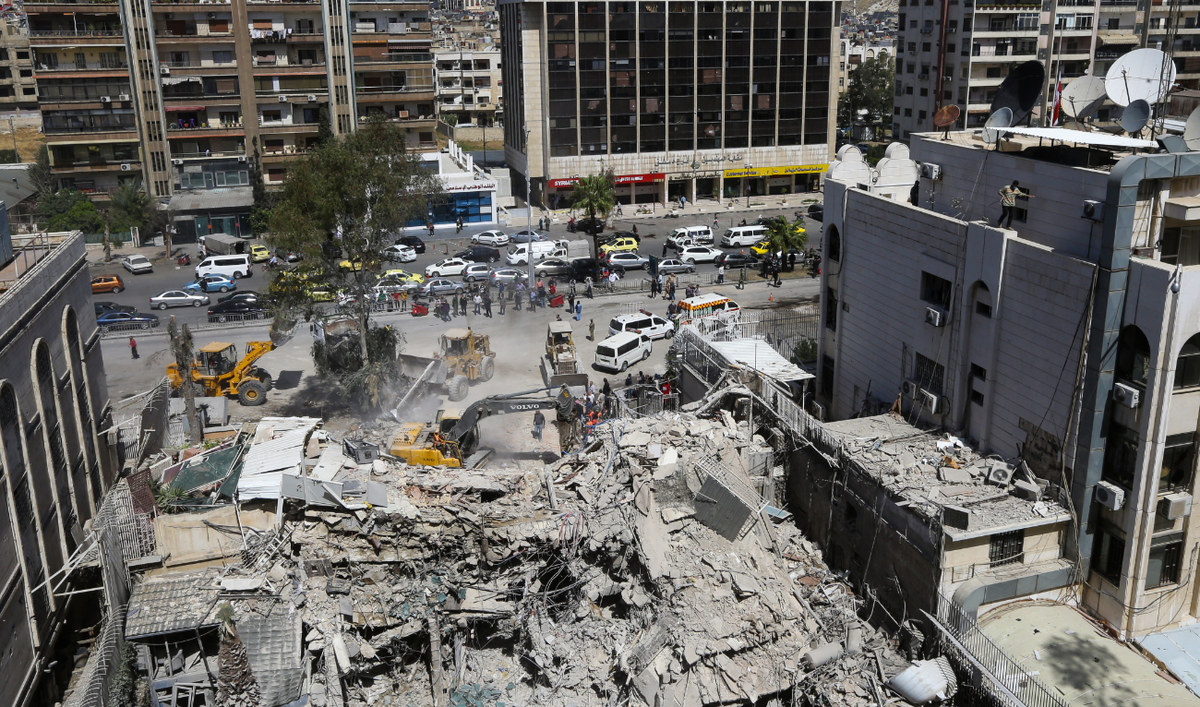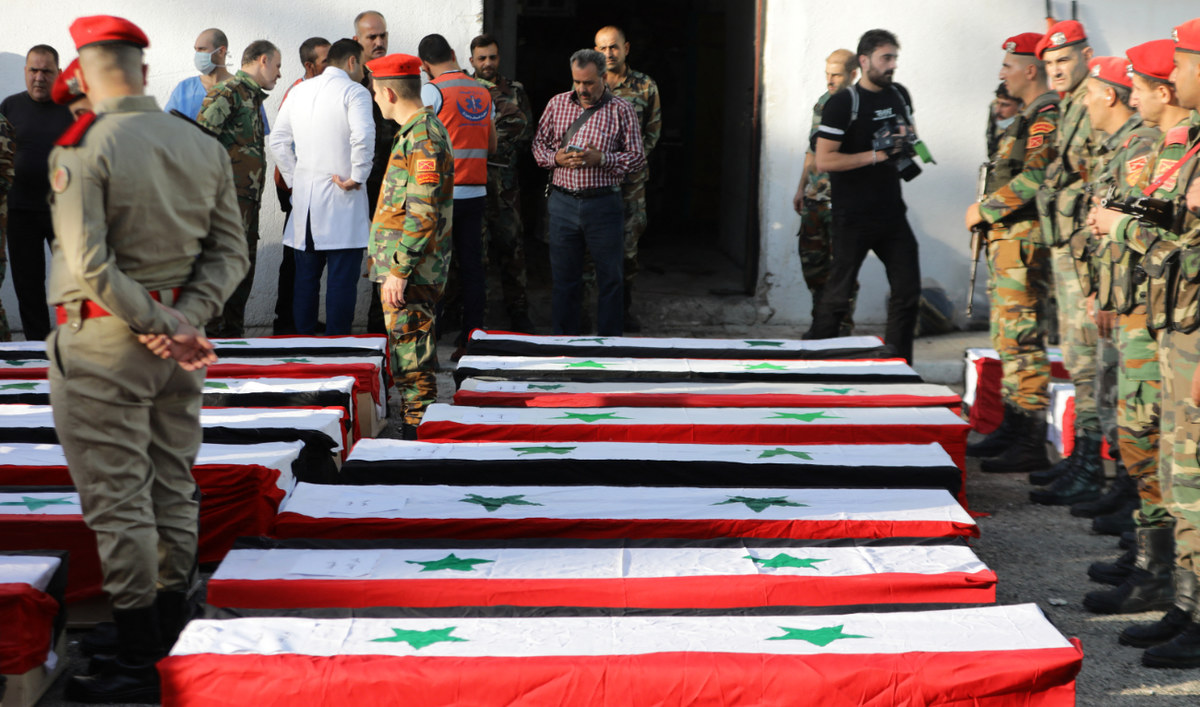LONDON: More than 13 years have passed since the onset of Syria’s brutal civil war, with millions of Syrians continuing to endure displacement, destitution, and even renewed bouts of violence, with no political resolution in sight.
And yet, with the world preoccupied with simultaneous crises in Gaza and Ukraine, Syria’s plight seems to have faded into the background, becoming a mere sideshow in Iran and Israel’s escalating confrontation.
Omar Al-Ghazzi, an associate professor of media and communications at the London School of Economics, believes “the scale of killing in the genocidal war on Gaza has sadly raised the bar of reporting on human suffering, particularly in Arab countries.
“News media are so saturated with stories of human suffering in Gaza that wars in other countries, such as Syria and Sudan, get much less coverage,” he told Arab News. “This shows how mass killing in Gaza cheapens human life everywhere.”

According to the UN, 5 million Syrian refugees are living outside the country, while at least 7.2 million others are internally displaced. (AFP)
Israel’s military campaign in Gaza, launched in retaliation for the Oct. 7 Hamas-led attack on southern Israel, has killed more than 34,000 people, according to Gaza’s health ministry, and displaced more than 90 percent of the enclave’s population.
Nanar Hawach, a senior Syria analyst at International Crisis Group, concurred, saying that “international reporting on the Middle East is focused on the Gaza war and its spillover to regional countries, which has further reduced the visibility of the Syrian conflict.
“A status quo has prevailed in Syria since 2020,” he told Arab News. “With frozen front lines and a stalled peace process, there is little progression or change to draw renewed attention.”
Since Oct. 7, media attention has focused almost exclusively on Israeli attacks on Syrian targets, including Iran’s interests in the country.
One recent Syria-related incident that gripped the world’s attention was the suspected Israeli strike on the Iranian Embassy’s annex in Damascus, which killed Quds Force commander Mohammad Reza Zahedi and his deputy.

Rescue workers search in the rubble of a building annexed to the Iranian embassy after an air strike in Damascus on April 2, 2024. (AFP)
“In terms of geopolitics, the status quo in Syria seems to have settled on a hum of internal warfare,” said Al-Ghazzi. “News media are only interested in the Syria story if it affects the stand-off between Iran and Israel.
“There are also regional and international actors who are interested in portraying Syria as a safe country for the resettlement of refugees, which may also explain the lack of appetite in covering ongoing warfare there.”
There are currently more than 5 million Syrian refugees living outside the country, while at least 7.2 million others are internally displaced, according to UN figures.
Neighboring host countries, including Turkiye, Lebanon and Jordan, have been pushing Syrian refugees to return, often involuntarily, claiming the war has ended and that their areas are now safe. Others have normalized relations with the Bashar Assad regime.
But the reality on the ground is grim, offering little hope for safe refugee repatriation.

Children attend class in make-shift classrooms at a camp for the displaced in Syria’s northwestern Idlib province on December 20, 2021. (AFP)
Syrians inside the country continue to endure many hardships, made worse by economic pressures, persecution by armed factions, and the aftermath of the Feb. 6, 2023 twin earthquakes that devastated parts of the north.
Anti-government protests in the southern Druze-majority city of Suweida have been ongoing since August due to deteriorating economic conditions, with smaller demonstrations also taking place in Daraa.
Syria has also been “facing a massive upsurge in violence” on several fronts since September last year, according to Louis Charbonneau, the UN director at Human Rights Watch.
In an interview last month with Erbil-based media agency Rudaw, Charbonneau said that Syria has seen “a severe increase in attacks on civilians.”
In late April, Syrian regime forces clashed with what the country’s defense ministry referred to as a “terrorist group” that attempted an attack on a military post near Idlib in the country’s opposition-held northwest.
INNUMBERS
102 Civilians, including 11 children and 14 women, killed in March, according to The Syrian Network for Human Rights.
5 Individuals who died of torture in March in Syria, the SNHR said.
Meanwhile, a senior official at a Russian center in Syria, Rear Adm. Vadim Kulit, told news agencies his country’s aircraft destroyed “two sites serving as bases for fighters taking part in the shelling of Syrian government forces. More than 20 terrorists were liquidated.”
Kulit also said Syrian regime forces lost a soldier a day earlier when they came under fire from militants in Latakia.
In the southern governorate of Daraa, where the uprising against the regime began in 2011, a series of explosions has kept residents in a constant grip of anxiety.
The most recent of these took place in early April, when an explosive device “planted by terrorists” in the city of Sanamayn killed seven children, according to state media. Local militia leader Ahmad Al-Labbad was accused of planting the bomb, with the explosion sparking clashes the following day between rival armed groups in Daraa.
Twenty people were killed in the subsequent fighting, including three of Al-Labbad’s family members and 14 of his fighters, according to the UK-based Syrian Observatory for Human Rights.

People gather around ambulances and a fire truck at the scene of a bomb explosion in the norther Syrian city of Azaz, early on March 31, 2024. (AFP)
In northern Syria, the Turkish-backed Syrian National Army militia and its Military Police have been accused by Human Rights Watch of committing human rights abuses in the areas under their control.
The SNA invaded the Afrin and Ras Al-Ain regions, territories that had previously been a part of the Kurdish-led Autonomous Administration of North and East Syria, in 2018 and 2019, respectively.
Noting the “clear, intentional demographic changes in Afrin,” Charbonneau said in his interview with Rudaw that the SNA has been “removing Kurds who are living in these areas and then replacing them with Arabs who were living in other parts of Syria.”
A report published in March by the UK-based Syrian Network for Human Rights also claims that the US-backed and Kurdish-led Syrian Democratic Forces have been targeting areas in the Aleppo governorate with “indiscriminate and disproportionate shelling” in “a clear violation of international humanitarian law.”
The report added that the “group’s indiscriminate killings amount to war crimes.”
In Idlib, a suicide bombing early this month in the town of Sarmada killed Abu Maria Al-Qahtani, one of the founders of Al-Nusra Front, which renamed itself Hayat Tahrir Al-Sham after severing ties with Al-Qaeda.

Mourners march with the body of Abu Maria Al-Qahtani during his funeral in Syria’s Idlib on April 5, 2024. (AFP)
The Syrian Network for Human Rights’ report said that Syrian regime forces in February carried out attacks on armed opposition factions in the rural parts of Aleppo, Idlib, and Hama.
October last year saw a week of intense airstrikes by Syrian regime and Russian forces on Idlib and parts of western Aleppo. This bombing campaign was triggered by a drone attack on a Syrian military academy in Homs, which killed more than 100 people, including civilians.
Reuters had described the attack on the Homs military academy as “one of the bloodiest attacks ever against a Syrian army installation.”
Also in February, US airstrikes targeted regime-controlled areas in Deir ez-Zor governorate, focusing on military outposts hosting pro-regime Iranian militias, the report added.

Syrian soldiers arrange caskets during the funeral of the victims of a drone attack targeting a Syrian military academy, outside a hospital in Homs on October 6, 2023. (AFP)
Camille Alexandre Otrakji, a Syrian-Canadian analyst, believes the violence in Syria has slipped from global attention because “many media organizations prioritize what is best for Israel.
“Unfortunately for Syrians, Israel’s interests align with the continuation of conflict in their country,” he told Arab News. “Raising awareness of their suffering can exert pressure on the international community to actively pursue negotiated compromises to end the conflict, which is not in Israel’s interest.
“Western media rarely exhibited an interest in outcomes other than victory for the side they supported and championed.” However, “as that side has largely dissipated, only a disparate collection of unattractive armed groups remains, challenging their common portrayal as the ‘good side.’”
He added: “The novelty and intensity of a conflict influences perceptions of its newsworthiness. The 13-year conflict in Syria peaked years ago, leading to coverage fatigue and a general sense of Syria fatigue among both audiences and activists. Charitable organizations are also experiencing a noticeable decline in donations for Syria.”

Camille Alexandre Otrakji, a Syrian-Canadian analyst, believes the violence in Syria has slipped from global attention because “many media organizations prioritize what is best for Israel. (AFP)
Moreover, as social media activists “have realized that their activism or influence does not translate into tangible gains on the ground,” their motivation to continue covering the conflict in Syria “has dramatically declined.”
UN experts believe the only way to end the Syrian conflict is through a political process. But for more than a year, “the intra-Syrian political process has been in deep freeze,” UN Special Envoy for Syria Geir Pedersen said in August.
“A continued stalemate is likely to increase international disengagement,” Hawach of the International Crisis Group told Arab News. “Without significant concessions from Syrian actors and the involved external parties, the Syrian issue risks becoming a forgotten case.”





























